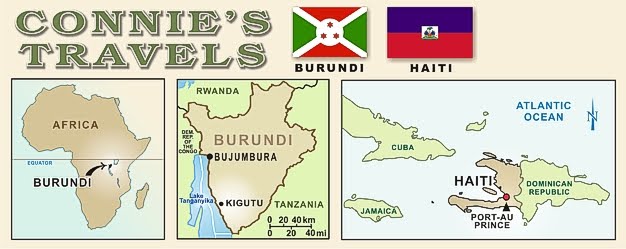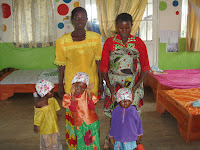


Cholera is a very dark hell. Not like anything I have ever seen or could have imagined. The urgency to perform is so damn constant, there is barely a moment to breathe…it is just work and sleep and sometimes eat.
Hydrating them is the key, they come in often close to death and look like they are dead except that they are puking and shitting volumes. IVs are a major challenge to start and keep going and patent. Their clotting factors must be way off, have to constantly fiddle with the IVs, often restart them and they have no veins, their bodies are shutting down and they are as cold as ice. Then getting and keeping them drinking the oral rehydration solution, even though they just vomit it back up. And keeping them clean…oh the inhumanity. There is no dignity involved in this disease other than the compassion that we feel, and them saying an occasional quiet merci, or just making eye contact…but mostly they are too sick to really care.
Most of our patients are on cots that are soaked with liquid cholera (looks like rice water…sortof…it’s the lining of their intestines ) and bleach, with a bucket alongside to use if they can. We try to keep a plastic barrier between them and the cot…yeah, not entirely successful. Some are on the wooden cholera beds… plastic covered benches with holes cut in them, the bucket underneath. The smell of cholera really isn't that bad...kind of sweet and slightly fishy, weird, I was expecting worse. I think the sound of people shitting leaves more of an impression, it sounds like a faucet had been turned on full force. They can fill half a bucket in one sitting. And yes we do use buckets. Rather an efficient method and the only one that makes sense. Cholera is a very practical disease, so simple to treat....but it is a full on battle. There is so much ignorance and suspicion surrounding it. The lack of education amongst the people in regards to the disease is resulting in thousands of people dying when it’s completely preventable. Severe diarrhea is prevalent here anyway, so when people get the symptoms of cholera they don’t react much differently because Haiti hasn't seen a disease like this in over 50 years. Cholera is 100% treatable as long as you get to the hospital in time. Unfortunately, people wait too long to bring their loved ones to the hospital, and once they arrive it’s too late, or they just don’t have the means to transport them, and they don’t make it to the hospital at all. Also public transportation, tap-taps or motorcycles are beginning to refuse to transport people with cholera.
Another level of frustration and quite honestly sadness, is the incredibly low skill level of the Haitian nurses and their indifference....it is mindboggling. They refuse to clean the patients, or to give them ORS...and I mean flat out refuse and often let the IVs run dry...which often resultes in the IVs clotting off....which then takes a major effort to save the site, or having to start a new one. They even go so far as to shut them off, and hide the clamp under whatever is covering the patient. So, if when making a quick check we saw a full or partial bottle of LR we would think it was good for the time being. We learned that trick early on and learned to look for the drip. No drip, find and check the clamp. I eventually have just detached myself from those nurses and worked around them. And fortunately there are some that really shine, are so smart and so dedicated. But I know that if we weren't here, many many many more people would die...no question. Pretty much everyone is naked because they have soiled their clothes and those have been burned. We cover them with whatever we have, mostly plastic surgical gowns…and at night they are freezing. We used to diaper most patients when they first came in because they are too weak to use the buckets, yes adults …but we have run out of those, so you guessed it…naked…what I would give for a Pamper.
We wear the plastic gowns as barriers… and gloves…at all times, I probably change my gloves at least 50-60 times in a shift. I also wash my hands and arms often with the ever present bleach solution.. and do not get my hands near my face....for any reason. I wear rubber boots several sizes too big…and even though it is the middle of the night…I am dripping with sweat. Hard not to touch people skin to skin, but I just don’t. We try to clean people with baby wipes, but I’m not sure there are enough of those on this planet for this disease….we always run out. The smell is…well, it is distinct and am sure I will recognize it anywhere…right now I am used to it and it is what it is and I don’t think about it. I actually don’t think about much except checking IVs, keeping them going, keeping people drinking, keeping them clean, and then hydrate…checking IVs, drinking, clean,…..hydrate….IVs, drinking, clean….simple, simple, simple yet exhausting…BUT when I see someone go from death to life in a matter of, sometimes, hours…it is all good and for a moment I remember that life really is beautiful….and I take a breath and….hydrate…..IVs, drinking, clean……
I am falling asleep as I write this, hitting wrong keys, but not really caring. head nodding…slight drool coming out of the corner of my mouth but by now I am so conditioned not to touch my mouth that it takes me a moment, while I try to figure out what to do about it. Finally I turn my head and wipe my mouth on my shoulder…on the inside of my shirt.
There are images:…locked in my brain, I suspect, forever…
The cleaning person moping the cot and the patient’s butt with the mop used on the floor (!!!….so wrong)
The woman walking around the camp fully dressed with her IV bottle on her head ( tubing attached and inserted into her left hand).
The old man sitting on the commode chair all night outside Tent 2 (wearing only the plastic gown) because, when he got up off his cot to walk outside, it was immediately filled with another (sicker) patient.
The perfectly formed tiny fetus between the woman’s legs I found when I was checking to see if she had soiled herself.
The old woman I talked with(well, that’s being generous…me:ca va? Her:ca va bien,me: pas vomit?..her: pas vomit…me: dyrea? Her: wi deux fois…) as I restarted her IV just a few hours before, only to find her cold and stiff and looking very peaceful and very dead.
The news of cholera spreading rapidly in Haiti is the worst possible. I don’t want to leave



































